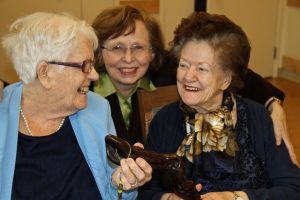Depression and loneliness contribute to functional declines, and mortality.(1) The associated health risks for loneliness alone are significant and include premature mortality and poorer health(2), dementia and how quickly dementia progresses and numerous poor health outcomes, such as cancer and heart disease(3). Research shows that peers helping one another can reduce both depression and loneliness among older adults.(4-6)
THE STUDY
A new mentoring program
The novel peer mentoring program, Java Mentorship, involves community volunteers (community mentors) and resident volunteers (resident mentors) who form a supportive team and provide support and visitation to other residents that are lonely or socially isolated (visitees).
What we did
We conducted a 6 month mixed-methods feasibility study in collaboration with the University of British Columbia, Schlegel-UW Research Institute for Aging and Schlegel Villages. A total of 211 participants took part. In the study community mentors (n = 65), resident mentors (n = 48) staff facilitators (n = 24) and visitees (n = 74) were enrolled in 10 residential care sites across Ontario.
The ground breaking results
New data analyses (presented recently at the International Federation for Aging) revealed a statistically significant 30% decrease in depression scores among resident mentors, as measured by the Geriatric Depression Scale Short Form (GDS-SF) (p = .04; d = .30) and a significant reduction in loneliness scores, as measured by the UCLA Loneliness Scale (ULS-6), (p = .04; d = .23).
30% decrease in depression scores among resident mentors, as measured by the Geriatric Depression Scale Short Form (GDS-SF) (p = .04; d = .30) and a significant reduction in loneliness scores, as measured by the UCLA Loneliness Scale (ULS-6), (p = .04; d = .23).
In addition, we found a significant reduction in loneliness (p = 0.02; d = .76) and depression (p = 0.02; d = .76) among residents being visited (visitees). There was also a statistically significant 60% increase in the number of monthly programs attended by visitees at 6 months compared to baseline (p = 0.01). Cohen’s effect size (r = .37).
Discussion
This research shows that having a new purposeful identity or position in their community can have considerable ramifications for residents. Most importantly, residents move from being isolated within their communities as recipients of care, to being contributing social citizens engaged in meaningful activities to improve quality of life for their peers and for themselves.
Submitted by
Kristine Theurer, MA (Gerontology)
PhD Candidate, University of British Columbia
References
(1)Bhatti, A., & Haq, A. (2017). The pathophysiology of perceived social isolation: Effects on health and mortality. Cureus, 9(1), e994. doi:10.7759/cureus.994
(2)Holt-Lunstad, J., Smith, T., B., Baker, M., Harris, T., & Stepheson, D. (2015). Loneliness and social isolation as risk factors for mortality: A meta-analytic review. Perspectives on Psychological Science, 10(2), 227-237. doi:10.1177/1745691614568352
(3)Cacioppo, J. T., & Cacioppo, S. (2014). Social relationships and health: The toxic effects of perceived social isolation. Social and Personality Psychology Compass, 8(2), 58-72. doi:10.1111/spc3.12087
(4)Cruwys, T., Haslam, S. A., Dingle, G. A., Jetten, J., Hornsey, M. J., Chong, E. M. D., & Oei, T. P. S. (2014). Feeling connected again: Interventions that increase social identification reduce depression symptoms in community and clinical settings. Journal of Affective Disorders, 159(20), 139-146. doi:10.1016/j.jad.2014.02.019
(5)Finn, L. D., Bishop, B., & Sparrow, N. H. (2007). Mutual help groups: An important gateway to wellbeing and mental health. Australian Health Review, 31(2), 246-255.
(6)Theurer, K., Wister, A., Sixsmith, A., Chaudhury, H., & Lovegreen, L. (2012). The development and evaluation of mutual support groups in long-term care homes. Journal of Applied Gerontology, 33(4), 387-415. doi:10.1177/0733464812446866
Disclosure
Kristine Theurer is the founder of Java Group Programs and receives remuneration for trainings and materials. This work was supported in part by the Social Sciences and Humanities Research Council of Canada and University of British Columbia’s Public Scholars Initiative.

